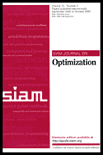
SIAM JOURNAL ON OPTIMIZATION
Scope & Guideline
Elevating the standards of optimization scholarship.
Introduction
Aims and Scopes
- Optimization Theory and Algorithms:
The journal emphasizes rigorous theoretical advancements in optimization, including the development of new algorithms, convergence analyses, and optimality conditions. - Applied Optimization:
Research that applies optimization methods to real-world problems across various fields such as engineering, finance, and operations research is a core focus. - Stochastic Optimization:
The journal covers topics related to optimization under uncertainty, including stochastic programming and robust optimization methods. - Nonconvex Optimization:
There is a significant emphasis on nonconvex optimization problems, exploring methods and algorithms that tackle challenges in this area. - Multi-objective and Bilevel Optimization:
The journal includes studies on optimization problems that involve multiple objectives or hierarchical decision-making scenarios. - Optimization on Manifolds and Special Structures:
Research that explores optimization techniques on manifolds and other structured spaces, which often arise in advanced applications, is highlighted.
Trending and Emerging
- Machine Learning and Data-driven Optimization:
Research exploring the intersection of optimization and machine learning is on the rise, with a focus on improving algorithms for training models and making decisions based on large datasets. - Robust and Distributionally Robust Optimization:
There is increasing attention on methods that address uncertainty in optimization, specifically robust and distributionally robust optimization techniques that ensure solutions are reliable under varying conditions. - Nonconvex and Complex Optimization Problems:
An upsurge in interest regarding nonconvex optimization reflects the complexity of real-world applications, leading to innovative algorithms designed to find local and global minima. - Decentralized and Federated Optimization:
Emerging themes in decentralized and federated optimization algorithms are gaining traction, particularly with the growth of distributed systems and the need for collaborative solutions. - Optimization on Manifolds:
The exploration of optimization techniques on manifolds and in specialized geometric settings has gained momentum, reflecting the needs of modern applications in fields like robotics and computer vision.
Declining or Waning
- Traditional Linear Programming Techniques:
While still important, the focus on classical linear programming techniques has decreased as more complex and nonlinear optimization methods gain traction. - Basic Gradient Descent Methods:
The use of basic gradient descent methods is becoming less common in favor of more sophisticated algorithms that offer better convergence properties and efficiency. - Static Optimization Models:
There is a noticeable decline in papers addressing static optimization models, as dynamic and adaptive models are increasingly preferred in various applications.
Similar Journals
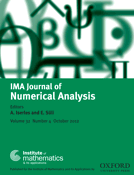
IMA JOURNAL OF NUMERICAL ANALYSIS
Elevating Research in Applied Numerical AnalysisIMA Journal of Numerical Analysis, published by Oxford University Press, stands as a premier platform for cutting-edge research in the field of numerical analysis, exemplifying the latest advancements and methodologies in applied, computational, and general mathematics. Since its inception in 1981, this esteemed journal has continually contributed to the academic community by publishing high-quality, peer-reviewed articles that foster innovation and collaboration among researchers. With an impressive Q1 ranking across multiple categories, including Applied Mathematics and Computational Mathematics, it plays a crucial role in disseminating knowledge, as indicated by its Scopus rankings which place it in the top 25% of journals within its field. Although the journal is not open access, it remains a vital resource for academics, professionals, and students eager to engage with the ongoing evolution of numerical methods. By serving as a conduit for novel ideas and rigorous research, the IMA Journal of Numerical Analysis ensures that its contributors and readers are at the forefront of this dynamic discipline.
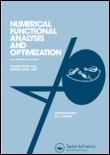
NUMERICAL FUNCTIONAL ANALYSIS AND OPTIMIZATION
Advancing mathematical frontiers through innovative analysis.NUMERICAL FUNCTIONAL ANALYSIS AND OPTIMIZATION, published by Taylor & Francis Inc, is a premier international journal dedicated to advancing the fields of analysis, optimization, and applied mathematics. With its ISSN 0163-0563 and E-ISSN 1532-2467, this journal has established itself as a vital resource for researchers and practitioners seeking to explore innovative methodologies and applications. Covering a broad spectrum of topics intersecting mathematical analysis and computer science, it has consistently ranked in the Q2 tier for Analysis and Control and Optimization categories and is well-regarded in the communities of Signal Processing and Computer Science Applications. The journal's commitment to publishing high-quality research ensures significant contributions to solving complex problems in various fields, making it an essential reference for students, academics, and industry professionals. With a publishing history dating back to 1979, it encourages the dissemination of groundbreaking ideas and practical methodologies, fostering a collaborative academic environment. Access to the published articles may vary, so contributors and readers are encouraged to engage with the latest findings and ongoing research through the journal’s platform.

ENGINEERING OPTIMIZATION
Connecting Theory with Practice in EngineeringENGINEERING OPTIMIZATION is a premier academic journal published by Taylor & Francis Ltd that has been at the forefront of the fields of Applied Mathematics, Computer Science Applications, Control and Optimization, Industrial and Manufacturing Engineering, and Management Science and Operations Research since its inception in 1974. With an impressive convergence period extending through 2024 and categorized in the Q2 quartile across various relevant disciplines, this journal is well-regarded for its rigorous peer-reviewed articles that address the latest advancements in optimization methodologies and their applications across industries. With current Scopus rankings placing it in the top percentiles for Applied Mathematics and Control and Optimization, ENGINEERING OPTIMIZATION serves as a vital resource for researchers, professionals, and students alike, dedicated to pushing the boundaries of knowledge and innovation in engineering and related fields. This journal does not offer Open Access; however, it remains accessible through institutional subscriptions and university libraries.

Journal of the Operations Research Society of China
Empowering Decisions, Transforming Research.Journal of the Operations Research Society of China, published by SPRINGER HEIDELBERG, stands as a pivotal platform for advancing the fields of Operations Research, Applied Mathematics, and Decision Sciences. With an ISSN of 2194-668X and an E-ISSN of 2194-6698, this journal not only serves as a conduit for innovative research from 2013 to 2024 but also maintains a commendable Q2 ranking in Applied Mathematics and Mathematics (miscellaneous), reflecting its impact and relevance in the academic community. Situated in the United States, the journal fosters an interdisciplinary approach, inviting researchers, practitioners, and students to engage with cutting-edge findings and methodologies. Although currently not an Open Access journal, it offers a wealth of knowledge that empowers professionals in management science and operations research, as evidenced by its rankings—53rd out of 399 in general mathematics and 194th out of 635 in applied mathematics. This positioning highlights the journal's commitment to quality, contributing significantly to the body of knowledge in these dynamic fields.

JOURNAL OF OPTIMIZATION THEORY AND APPLICATIONS
Innovating Solutions for Real-World Optimization ChallengesJOURNAL OF OPTIMIZATION THEORY AND APPLICATIONS, published by Springer/Plenum Publishers, is a prestigious academic journal that has been at the forefront of the fields of applied mathematics, control and optimization, and management science since its inception in 1967. With an ISSN number of 0022-3239 and an E-ISSN of 1573-2878, it is recognized for its rigorous peer-reviewed content and aims to provide a platform for the dissemination of research that advances theoretical frameworks and practical applications in optimization. As of 2023, the journal holds an impressive Q1 ranking in both Applied Mathematics and Control and Optimization, showcasing its impact and influence in these domains. The journal is also highly ranked in the realm of management science and operations research, making it a vital resource for academics, professionals, and students alike. Though it does not currently offer open access, the journal's articles are widely accessible through institutional subscriptions. Significantly, its long-standing commitment to scholarly excellence positions it as a key player in fostering innovative research and discussions that impact various real-world challenges in optimization.
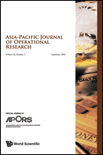
ASIA-PACIFIC JOURNAL OF OPERATIONAL RESEARCH
Empowering Research, Enhancing Decision-MakingASIA-PACIFIC JOURNAL OF OPERATIONAL RESEARCH is a premier academic publication dedicated to the dynamic fields of operational research and management science, published by WORLD SCIENTIFIC PUBL CO PTE LTD. Located in Singapore, this journal has been pivotal in contributing to the dialogue and development of innovative strategies and methodologies within the operational research community since its inception in 1991. With a focus on practical applications and theoretical advancements, it serves as an essential resource for researchers, practitioners, and students seeking to enhance their understanding and expertise in decision sciences. The journal has gained recognition with a Q3 ranking in Management Science and Operations Research in the 2023 category quartiles, underlining its significance in the academic landscape. The Scopus ranking positions it reasonably well, attracting contributions that address both contemporary and emerging challenges in the field. Although the journal operates under a traditional publishing model, it offers vital access to a wealth of high-quality research, making it a go-to source for key findings and methodologies in operational research. Through its rigorous peer-review process, the journal aims to foster collaborative efforts that advance knowledge and practice across the Asia-Pacific region and beyond.

EURO Journal on Computational Optimization
Catalyzing Breakthroughs in Computational OptimizationEURO Journal on Computational Optimization, published by ELSEVIER, is a leading open-access journal that has been advancing the field of computational optimization since its inception in 2013. Catering to a diverse audience of researchers, professionals, and students, this journal addresses critical developments in computational mathematics, control and optimization, and management science. With an impressive Q1 category ranking in multiple areas, including Computational Mathematics and Management Science and Operations Research, the journal serves as a pivotal platform for disseminating groundbreaking research and innovative methodologies. Its commitment to open access ensures that valuable insights are readily available to the global academic community. With a continuous publication timeline through 2024, the EURO Journal on Computational Optimization is positioned at the forefront of its field, fostering collaboration and innovation in optimization techniques and applications.
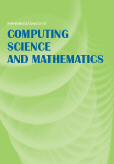
International Journal of Computing Science and Mathematics
Fostering Collaboration Across Computing and Mathematical DisciplinesThe International Journal of Computing Science and Mathematics, published by INDERSCIENCE ENTERPRISES LTD, is a pivotal platform for the dissemination of cutting-edge research in the intertwined disciplines of computing science and mathematics. With an ISSN of 1752-5055 and an E-ISSN of 1752-5063, the journal primarily serves the academic community engaged in applied mathematics, computational mathematics, theoretical computer science, and more, making significant contributions that resonate across various fields of technology and science. While the journal is currently categorized in the Q4 quartile for multiple related fields, including Applied Mathematics and Computational Theory, it continues to strive towards advancing the knowledge and practice within these areas. Spanning years from 2007 to 2010 and again from 2012 to 2024, the journal seeks to publish high-quality, peer-reviewed articles that not only address theoretical advancements but also explore practical applications of computing science in mathematical contexts, thereby fostering collaboration among researchers, professionals, and students alike. Please note that this journal is not available as Open Access, thus ensuring a curated content selection intended for dedicated research communities.
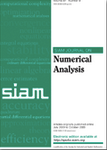
SIAM JOURNAL ON NUMERICAL ANALYSIS
Pioneering Insights in Applied Numerical AnalysisSIAM Journal on Numerical Analysis, published by SIAM Publications, is a leading academic journal dedicated to the rigorous exploration of numerical methods and algorithms across applied and computational mathematics. Since its inception in 1969, this journal has played a pivotal role in advancing the field, achieving a distinguished impact factor that places it in the Q1 quartile for Applied Mathematics, Computational Mathematics, and Numerical Analysis as of 2023. With Scopus rankings reflecting its high influence (Rank #102 in Applied Mathematics and Rank #16 in Numerical Analysis), this journal serves as an essential resource for researchers, professionals, and students aiming to stay abreast of cutting-edge developments in numerical methods. The journal's comprehensive scope covers theoretical advancements, implemented algorithms, and applications, making it indispensable for those engaged in high-level quantitative research and practice. Readers can access a wealth of innovative studies and insights, fostering a deeper understanding of numerical analysis techniques and their practical applications.

KYBERNETIKA
Exploring the Intersection of Theory and Application.KYBERNETIKA is a distinguished journal published by KYBERNETIKA in the Czech Republic, dedicated to advancing the fields of Artificial Intelligence, Control and Systems Engineering, Electrical and Electronic Engineering, Information Systems, Software, and Theoretical Computer Science. Since its inception in 1972, it has played a pivotal role in disseminating research findings and innovative theories, providing a platform for academic discourse and groundbreaking studies. The journal has evolved through various periods, including converged years from 1972 to 1989 and 1996 to 2024, showcasing a commitment to ongoing scholarship within the vibrant academic community. Its current standing in multiple categories reflects its importance, being ranked in the third and fourth quartiles in various disciplines, thus appealing to diverse researchers and professionals. While KYBERNETIKA does not offer Open Access, it remains a valuable resource for those interested in the latest developments in its respective fields. The address for submissions and inquiries is POD VODARENSKOU VEZI 4, PRAGUE 8 182 08, CZECH REPUBLIC. Engage with this invaluable repository of knowledge to stay at the forefront of research and innovation.